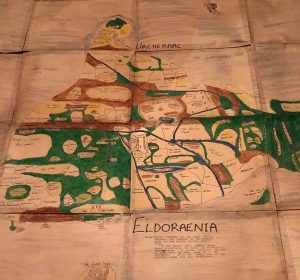My Roots in Fantasy
I first read JRR Tolkien’s The Hobbit in 1982 or so, and then The Lord of the Rings later that same year.
 The books speak of grand adventure, nobility, overwhelming evil, the hero’s journey (and, in these cases, the heroes are raging underdogs), and sacrifice, amongst many other things..
The books speak of grand adventure, nobility, overwhelming evil, the hero’s journey (and, in these cases, the heroes are raging underdogs), and sacrifice, amongst many other things..
I have no idea why swords and medieval adventure appealed to me as a kid. Maybe it’s because of that grand adventure. But Tolkien’s work was brilliant not only for its scope, but the depth of its history. Here was a fully formed universe. Everywhere the characters went had history. The roots tracked back long before these particular stories began.
I understand why people find Lord of the Rings boring – the writing is dense and can be flowery. When I read the books when I was young, I sped-read the songs. And the description can go on. (I love it all, but understand why others mightn’t.) But Tolkien accomplishes so much in those three books. Then you have the supporting material, like The Silmarillion, as well as various other books that contained early drafts and/or unfinished drafts of stories, each one feeding back into the main story: the battle for the Ring.
For example, I recall reading decades ago an unfinished story in which Gandalf explained why he’d chosen Bilbo to accompany the dwarves in The Hobbit. Gandalf recognised Sauron was returning, and feared what he could do with a dragon – Smaug – at his disposal. Gandalf’s motivation to aid the dwarves was to eliminate Smaug, and thus that threat. Gandalf chose Bilbo, because Gandalf knew Bilbo’s scent would confuse Smaug, who had not encountered Hobbits before.
How great is that? Most people probably thought The Hobbit was just a frivolous little children’s adventure, but – like all Tolkien’s Middle-earth work – it’s deeply layered. Peter Jackson tried to realise some of that in his movie trilogy adaptation of The Hobbit– particularly the battle to rid Sauron from Dol Guldur, which is only referenced in the book – but too often the story gets caught up in needless (and often unrealistic) action.
Tolkien taught me the importance of setting up a world that exists before page one. Too often now stories (and particularly movies) unfold as if nothing and nobody existed prior to that first page. The one innocuous example I’ll offer is from the android Data, one of the ensemble of characters in Star Trek: The Generation. In one scene, somebody uses a proverb, which stumps Data. It then has to be explained to Data what a proverb is. Cute moment. But Data is thirty years of age. Surely in that time he’s encountered a proverb, particularly given his fraternisation with humans, and he’s moved through the ranks of Starfleet to become a Lt Commander (the second highest rank on a ship). Nope. Because he didn’t exist before page one of that screenplay.
Whenever I sit down to write a story, I plan out the world as much as I can – geography (if required), locations, characters, character histories, etc. This informs the way the story develops. If supporting information is referenced, then I know immediately what it is because I’ve planned for it. I always say this is like consulting a map when you want to get somewhere new. You might not have taken the route before, but the map provides the information you need. You decide the rest.

When I wrote my first fantasy novel as a teen (back in the 1980s), I drew a map of where the story took place – it was a series of A4 sheets that I spread across the billiard table, and filled with kingdoms (I also had a Queendom), villages, cities, rivers, lakes, forests, mountains, and anything I could think of. I then sticky-taped all those loose sheets together and hung it above my typewriter. Later, I redrew the map (right) even bigger and much neater and stuck that above my PC.
I could track my characters’ progress as I wrote, know what they faced, know the dangers they might encounter, and how long it would take to get places. That helped shape my storytelling so I was never stumped as to what came next. I could see what next was. That stimulated ideas I may not have otherwise considered.
Fantasy generated one of my first loves with literature. As I grew older, I drifted away from it and became more widely read, and I stopped writing it almost altogether (with one exception).
But talking about it, it’s something I’d like to return to one day.
